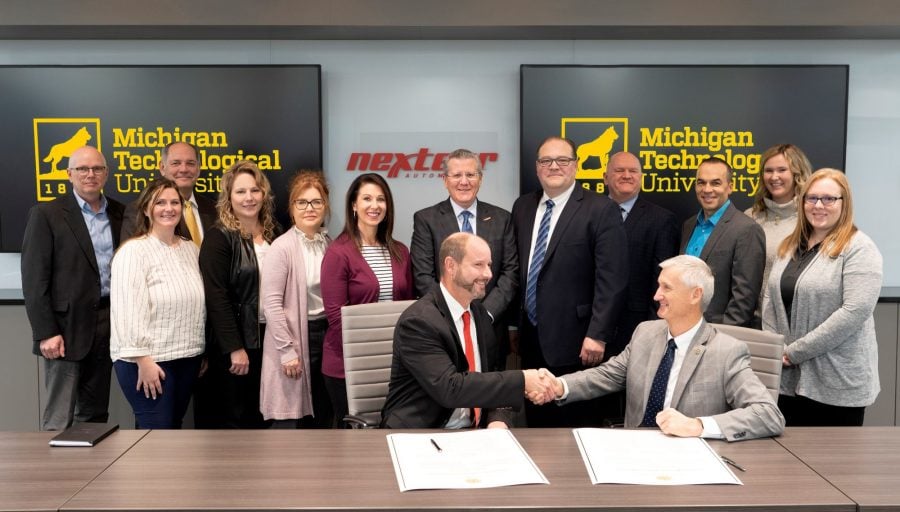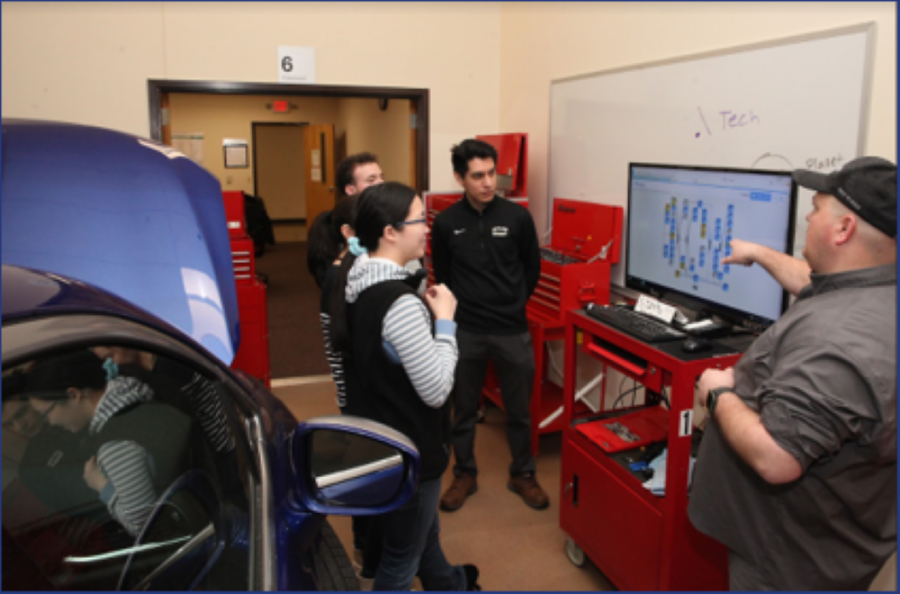Despite common perceptions, electric vehicles are not a new phenomenon. In fact, the first battery-powered electric vehicle was built in 1834—more than 50 years before the first gas-powered internal combustion vehicle. In fact, according to an IEEE Proceedings article by Chan (2013), more than one-third of automobiles in the United States were electric by 1912.
What’s behind this rapid growth? What benefits of electric vehicles attract consumers? What is the future of electric vehicles beyond our highways? And how can we continue to build electrical cars responsibly? Read on for more.
Accelerating into the Future with Electric Vehicles
Despite sputtering in the 1990s and early 2000s, advances in electric vehicles have evolved rapidly in recent years. After the wildly popular launch of electric vehicles from Tesla, automakers scrambled to expand their foothold in the market. And they’re getting plenty of help.
Government Cooperation
National governments worldwide are fast-forwarding the future of electric vehicles by setting specific benchmarks. For instance, in the U.S., the Biden administration’s wants half of all vehicles sold in 2030 to be electric. Furthermore, the Inflation Reduction Act encourages companies to install EV chargers at their properties. Those that do so can receive a 30% tax credit.
Also, the European Union’s goal by 2030 is to reduce net greenhouse gas emissions by at least 55 percent. They plan to do so through a combination of policies that are collectively called the “Fit for 55” program. Even local governments are undertaking strong sustainability initiatives. Paris is in the midst of an ambitious “Bike Plan” initiative to create 112 miles of new permanent bicycle lanes. Furthermore, the city aims to triple the number of bike parking spots to 180,000 by 2026.
Consumer Behavior
These government-sponsored measures are a response to shifting attitudes by consumers about alternative modes of transportation—especially among those who live in cities. One recent survey indicated that inner-city trips with shared bicycles and e-scooters have risen 60 percent year over year. This number is no surprise when you consider that, in 2020, electric bikes outsold electric cars in the U.S. by more than 2 to 1. Also, public consumers aren’t the only ones shifting to electric: The U.S. Army is planning to transition its non-tactical fleet of 177,000 to electric vehicles by 2035.
Improvements in Electric Vehicle Technology
And investors are taking notice of these electric trends. That is, nearly $330 billion in investments have been granted to more than 2,000 mobility companies over the last decade. These companies are focused on automation, connectivity, electrification, and smart mobility (ACES). Thanks to these investments, automakers may research and invent new and innovative ways to increase the quality and durability of electric vehicles. One ultimate goal: making electric vehicles less expensive than gas-powered cars.
By 2035, the largest automobile markets will go electric.
Considering Electric Vehicles Beyond Automobiles
When it comes to the future of electric vehicles, the possibilities go beyond highways and byways. From keeping electric vehicles on the road to changing the perception of electric vehicles in other modes of transportation, there are many innovations to get excited about and challenges to conquer.
Charging Infrastructure
There has been substantial growth in electric car sales. However, nearly half of U.S. consumers say battery or charging issues are their top concern when considering an electric vehicle. As a result, there have been increasing calls for improving charging infrastructure for electric vehicles. This infrastructure entails the network of charging stations, cables, and other equipment needed to power up these vehicles. A summary of this infrastructure is below.
- Public charging stations
- Home-based charging points
- Workplace chargers
- Necessary installation services
- Software
- Energy management systems
To help make charging easier for Americans, the US government has recently stepped in. For instance, the recently passed Bipartisan Infrastructure Law provides $7.5 billion toward strengthening charging infrastructure nationwide. A main objective is installing half a million public chargers by 2030.
Sustainable Mobility in Cities
As previously mentioned, Paris wants to become a “100 percent cyclable city.” However, Paris’s vision is not the only option for cities seeking to increase both mobility and sustainability. One possible potent solution from the McKinsey Center for Future Mobility is called “Seamless Mobility.” This solution is a flexible, highly responsive network of transportation options. These include a shared fleet of public electric vehicles, electrified mass transit, and urban planning meant to reduce emissions. Therefore, an average-sized city could reap up to $2.5 billion per year by 2030 by implementing Seamless Mobility practices.
Look! Up in the Sky!
The future of electric vehicles, however, isn’t limited to the road. That is, interest continues to grow in electric air travel through eVTOLs (pronounced “ee-vee-tols”)—electric vertical takeoff and landing aircraft. Think of them as safe, quiet, affordable, and environmentally friendly helicopters. Using eVTOLs as “flying taxis” for short flights or for trips normally taken by cars could substantially reduce emissions. Airbus Innovations, for example, is experimenting with electric and hybrid-electric propulsion systems.
Some major airlines are thinking even bigger when it comes to electric aircraft. For instance, United Airlines Ventures, Air Canada, and Mesa Airlines have made significant financial pledges. After joining the investment group for Swedish-based electric aviation startup Heart Aerospace, these companies ordered several 30-passenger electric planes.

Or Maybe Down to the Sea.
Cars and planes are not the only vehicles going electric. That is, electric boats are becoming more popular due to their low emissions, quiet operation, efficiency, and cost-effectiveness over traditional gas-powered boats. Some examples of electric boats include electric sailboats, electric ferries, electric speedboats, and electric fishing boats. More and more boat manufacturers are beginning to offer electric models, and electric boats are becoming more widely available.
Several boat manufacturers are offering electric models, including Sea Ray, Yamaha, Beneteau, Bayliner, Chris Craft, Viking, and Four Winns.
Building Electric Vehicles Responsibly
Although the benefits of electric vehicles can be substantial, it’s important to ensure those benefits aren’t canceled out by the environmental and human impact of manufacturing electric vehicles and infrastructure.
Sourcing and Mining Raw Materials
Virtually all batteries used by electric vehicles require lithium. And its price has skyrocketed—by about 550 percent in one year—as the demand for electric vehicles has grown. Mining more lithium, as well as other necessary elements such as cobalt, means more manpower. However, this mining, which often occurs in countries such as China, Guinea, and the Democratic Republic of the Congo, can be a dirty business. Miners are often subject to unsafe working conditions and potentially toxic side effects of dust and fumes. As with other human and workers’ rights campaigns in recent years, raising awareness of the plight of these workers can pressure on manufacturers and governments to regulate and improve working conditions.
Ensuring Equitable Electricity
The U.S. government’s investment in charging infrastructure is substantial. Nonetheless, this investment will only be successful if those chargers are equitably distributed among its citizens. Currently, most chargers tend to be installed in higher-income areas. For example, California has 112 chargers per 100,000 people in high-income urban districts. Contrast this number with only 24 chargers per 100,000 households in urban districts with low to moderate incomes.
States that have taken specific action to improve their electric vehicle infrastructure include the following:
- Arizona
- Colorado
- Connecticut
- Hawaii
- Illinois
- Maryland
- Massachusetts
- New Jersey
- New York
- Oregon
- Washington
Furthermore, several other states, including Minnesota, Pennsylvania, Rhode Island, and Virginia are working to promote electric vehicle adoption.

7 in 10 survey respondents who don’t own electric vehicles said the areas near their homes lack a significant number of chargers.
Promoting Electric Vehicles
Nonetheless, roadblocks to even greater adoption of electric vehicles can be overcome. And manufacturers and governments can be catalysts for meaningful change. For example, the European Union recently introduced legislation that would require battery manufactures to identify and respond to human rights or environmental issues in their raw-material supply chain. To help create greater equity in charging infrastructure, “cities and states should “think creatively about providing chargers that work well in public settings such as curbsides, parking lots, and rest stops” (McKinsey Group).
How Will YOU Influence the Electric Future?
You can play a role in creating electric vehicles and in helping others understand the benefits of vehicle electrification. One way to start is by furthering your education through an online graduate certificate or master’s program at Michigan Tech, which has a long and respected history of collaborating with the automotive industry.
Our university also offers several online graduate certificates and programs that meet the cutting edge needs of this industry. Some of these are the following:
- Master of Science in Electrical and Computer Engineering
- Master of Science in Mechanical Engineering
- Hybrid Electric Drive Vehicle Certificate
- Automotive Systems and Controls Certificate
- Control Systems Certificate
- Vehicle Dynamics Certificate
- Safety and Security of Autonomous Cyber-Physical System Certificate
Investigate these and other graduate programs at our Global Campus. Explore how Michigan Tech can help prepare you for the challenging, but exciting future of electric vehicles.
AUTHOR’S NOTE: This article is a joint effort of the brilliant Sparky T. Mortimer and Shelly Galliah. Whereas Mortimer provided the initial research and solid content, Galliah provided guidance for more material and then copyedited and formatted the content for this blog. All images, which are copyright-free, are from Creative Commons.











